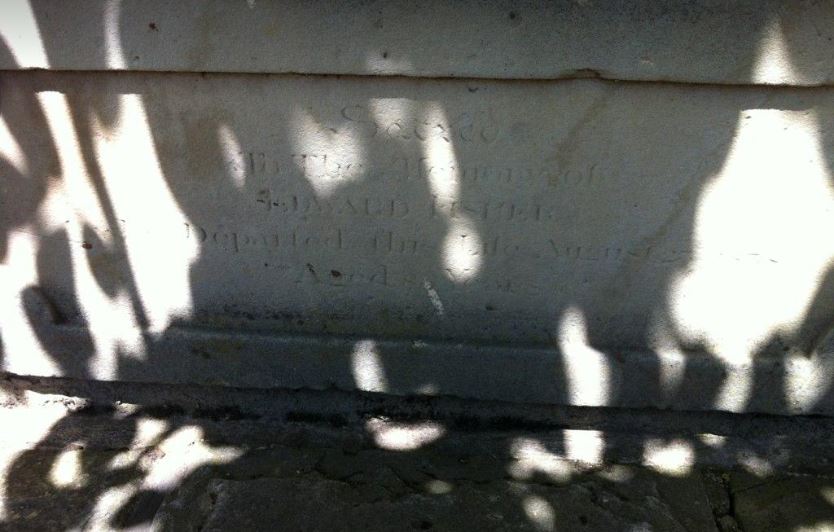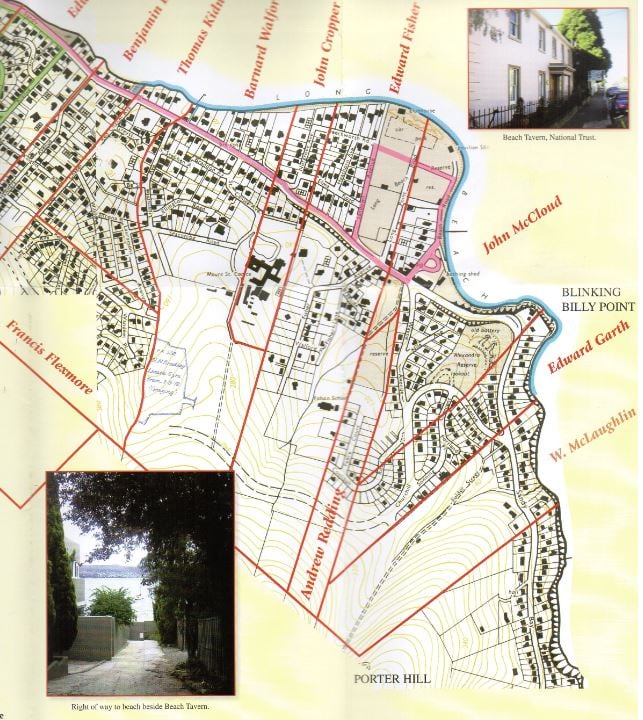
Edward Fisher - A Life Made Good
By Stephen Mulcahy
TFHS Inc. Member No. 8184
Situated in a quiet tranquil area directly behind the Supreme Court of Tasmania in Salamanca Place, Hobart and adjacent to St David's Park, there are several commemorative walls which incorporate headstones retrieved from St David's Park when it ceased operation as the primary cemetery for Hobart.1
These headstones reflect the breadth and diversity of the early European settlers in what was Van Diemen's Land. One of those headstones is for Edward Fisher, a person who started life from very humble beginnings as a rural labourer in England receiving little or no education. And yet, after a life filled with both challenges and opportunities, the harshness of imprisonment and transportation, Edward went on to become a successful businessman and highly regarded member of the Hobart community.

Edward Fisher was born in 1751 in the rural area of Sedgley, Staffordshire, England. It is believed, but unconfirmed, that his father was also named Edward who was born in 1726 in nearby Tipton, Staffordshire. Edward's mother was Mary, born in 1720. 2
Edward was christened at the church of St Martin's, Tipton on 23 April 1751. One can imagine that Edward led a simple and humble life during his early years but all that changed as the result of some petty thieving when Edward was arrested on 12h February 1788.3
Edward was brought before the court on 30 July 1788 and the following information is available from the Indictment in the Oxfordshire Circuit Assizes records (Assizes 5/108), "Edward Fisher late of the Parish of Sedgeley, Staffs, labourer, with Thomas Baker, James Haden, Danial Aston and James Dodd, tried at the Summer Assizes 28 George Ill (1788) for feloniously stealing two hempen sacks, value 3/-, and 275 pounds weight of hops, value $20, goods of Hugh Evans' of the Parish of Sedgley on 12" February 28 George III." 4
The stolen goods were received by John Whitehouse, victualler. Edward was found guilty of those charges and was sentenced to transportation for seven years. Interestingly, and perhaps surprisingly given this guilty verdict, at the same Assizes, Edward was also charged with stealing an amount of bacon but was found not guilty on that charge.
By today's standards and expectations, the sentence of seven years appears harsh. However, in England at this time, poverty and necessity continued to provide impetus for crime such as theft, sometimes simply so that people could feed themselves and their families. Prisons and prison hulks were suffering from overcrowding which had been compounded further by the closure of transportation to America as a result of their War of Independence. England was also anxious to shore up its territorial claim, primarily from the French, to the land which Cook had "discovered" only eighteen years earlier.5
As was the case in the early days of transportation and whilst the initial settlement - those from the first and second fleets - in New South Wales readied itself for greater numbers of convicts, Edward remained in prison, in England until 1791. It is most probable that during this time Edward would have been impounded on one of the large prison hulks which were permanently moored in the Thames Estuary.
And so it was that on the morning of 27 March 1791, the Matilda, carrying Edward Fisher and two hundred and forty-nine other male convicts, and under the command of Master Matthew Weatherhead, set sail from Portsmouth as part of the Third Fleet. It would be difficult to overstate the dreadful conditions which Edward and his fellow convicts had to endure during the long voyage, via the Cape of Good Hope, to the new colony. 6, 7
The Matilda arrived in Port Jackson on 1°August 1791, an arduous journey of four months and five days. On seeing the vessel arrive, Lieutenant Governor David Collins described the vision "The convicts in this ship, on their landing, appeared to be aged and infirm, the state in which they were said to have been embarked. It was not therefore to be wondered at, that they had buried twenty-five on their passage. Twenty were sick and were immediately landed at the hospital". 8
It had always been intended that Master Weatherhead would take the full compliment of convicts on to the settlement at Norfolk Island. However, as the Matilda by that stage was "leaky" the Governor approved the transport of the men on the Mary Ann, both ships belonging to the same owners. The Mary Ann was brought alongside the Matilda and the convicts were brought over with the exception of a selection of fifty men who were farmers who were sent to Parramatta. Those now on board the Mary Ann were joined by an additional "thirty-two convicts of bad character" who were already in the colony together with eleven privates from the New South Wales Corps.9
Despite its justified reputation as a very harsh place, it was Norfolk Island which afforded Edward the opportunity to turn his life around. Allowing for time already served both in England and on the journey to Australia, Edward now had a further four years to spend on the Island under Lieutenant Phillip Gidley King.
In his time on Norfolk Island, Edward completed his sentence, received a pardon and acquired land as a free man. Edward was married Elizabeth Gregory on 26 July 1801 by the Rev. Henry Fulton. Elizabeth had arrived on Norfolk Island as a child with her mother, Sarah who was a convict, on the Lady Juliana in the Second Fleet. Her father, Thomas, came out in the same Fleet on the Neptune. 10
It was on Norfolk Island that Edward and Elizabeth started what was to become a large family of eight children - five on Norfolk Island and three in Van Diemen's Land.
With the impending closure of the Norfolk Island settlement arrangements had to be made for the relocation of those living on the island. Guarantees were provided that land grants commensurate with their holdings on Norfolk Island would be given in their new home. 11
After a failed scouting trip to Port Dalrymple (now Launceston), it was decided that Hobart would be their new home. Edward Fisher and his family, together with fifty-two other families arrived at the Derwent River on board the Porpoise on 17 January 1808. Edward received a grant to an 85-acre farm at Sandy Bay which now encompasses Fisher Avenue. He received an additional grant of 200 acres at Oatlands in 1824, along with three of his sons who each received grants of 100 acres. 12
Upon his death at Sandy Bay on 23 August 1828, aged 85 years, Edward was a wealthy and successful man, a far cry from the poor English rural labourer who was convicted all those years ago. Edward Fisher is my Great, Great, Great, Grandfather.

Map showing Edward Fisher's Land Grants
1 Monument Australia, St David's Park Memorial Walls, Monument Australia website, n.d., < monumentaustralia.org.au/themes/culture/community/display/106117-st-david%60s-park-memorial-walls>, accessed 6 June 2022.
2 Richard Lord, Mrs E Mulcahy, [letter], 3 November 1967, copy held by the author 3 Lord to Mulcahy [letter], 3 November 1967
4 Indictments, Oxfordshire, Summer 1788, The National Archives, England, ASSI 5/108/44, accessed 18 June 2022
5 Sydney Living Museums, 'Why were convicts transported to Australia?', Sydney Living Museums website, n.d., < https://sydneylivingmuseums.com .au/stories/why-were-convicts-transported-australia>, accessed 10 June 2022.
6 Immigrant Ship Transcribers Guild, 'Australian Convict Ships 1791 Third Fleet', Immigrant Ship Transcribers Guild website, n.d., < https://www.immigrantships.net/v5/1700v5/au3rdfleet17910926_01.html>, accessed 11 June 2022.
7 Free Settler or Felon, 'Convict Ship Matilda 1791', Free Settler or Felon website, n.d., < https://www.freesettlerorfelon.com/convict_ship_matilda_1791.htm>, accessed 13 June 2022.
8 David Collins esq, 'An account of the English colony in New South Wales', T Cadell Jnr and W Davies, In the Strand, 1798, p 173.
9 Collins, 'An account of the English colony in New South Wales', p 172.
10 Irene Schaffer and Thelma McKay, 'Exiled Three Times Over- Profiles of Norfolk Islanders exiled in Van Diemen's Land 1807-1813',St David's Park Publications, 1992, p 35.
11 Lord to Mulcahy [letter], 3 November 1967.
12 James Backhouse Walker, 'The Deportation of the Norfolk Islanders to the Derwent in 1808', William Grahame Jun, Government Printer, 1895, p 19.
Bibliography
David Collins esq, 'An account of the English colony in New South Wales', T Ca dell Jnr and W Davies, In the Strand, 1798.
Free Settler or Felon, 'Convict Ship Matilda 1791', Free Settler or Felon website, n.d., < https://www.freesettlerorfelon.com/convict_ship_matilda_ 1791.htm>
Immigrant Ship Transcribers Guild, 'Australian Convict Ships 1791 Third Fleet', Immigrant Ship Transcribers Guild website, n.d.,
< https://www.immigrantships.net/v5/1700v5/au3rdfleet17910926_01 .html>
Monument Australia, 'St David's Park Memorial Walls', Monument Australia website, n.d., <https://monumentaustralia.org.au/themes/culture/community/display/106117- st-david%60s-park-memorial-walls>
The National Archives, England, Indictments, Oxfordshire, Summer, 1788
Irene Schaffer and Thelma McKay, 'Exiled Three Times Over - Profiles of Norfolk Islanders exiled in Van Diemen's Land 1807-1813', St David's Park Publications, 1992.
Sydney Living Museums, 'Why were convicts transported to Australia?', Sydney Living Museums website, n.d., < https://sydneylivingmuseums.com.au/stories/why-were-convicts-transported-australia>
James Backhouse Walker, 'The Deportation of the Norfolk Islanders to the Derwent in 1808', William Grahame Jun, Government Printer, 1895, p 19.
Related family names:
Fisher GregoryFor more information:
You can use this contact form to send an email message to Stephen Mulcahy